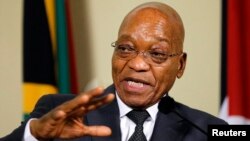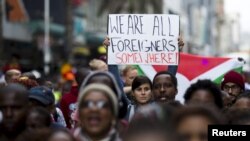After a protracted silence, South African President Jacob Zuma publicly has condemned a rise in attacks on foreign nationals in two major cities. But critics point out that the leadership in the Rainbow Nation — including Zuma himself — has been less than welcoming to foreign residents, and that a war of words started this conflagration. And the perpetual thorn in Zuma's side, opposition rabblerouser Julius Malema, says Zuma is to blame for the fact that South Africans increasingly see violence as the solution to their problems.
“We condemn the violence in the strongest possible terms," Zuma said. "The attacks violate all the values that South Africa embodies, especially the respect for human life, human rights, human dignity and Ubuntu. Our country stands firmly against all intolerances such as racism, xenophobia, homophobia and sexism.”
Strong words from President Jacob Zuma before a nation in the throes of violence against African immigrants. In recent weeks, his nation has seen an upswing in attacks against foreign residents — particularly lower-income residents originally from Ethiopia, Malawi, Somalia and Zimbabwe.
Criticism
The violence started in the coastal city of Durban and then spread to the economic hub, Johannesburg. But Zuma’s words before parliament failed to satisfy his critics, who immediately pounced on him.
Zuma’s biggest critic, far-left politician Julius Malema, delivered a rousing speech that highlighted — in more ways than one — that the president’s stoic, often stilted rhetoric is an impediment to his message.
“Mr. President, you come here, you want to condemn violence against xenophobia. But the Cubans have taught us that body language speaks volumes than prepared speech," he said.
"You come with a prepared speech, your body doesn’t suggest any other leader who is concerned about the killings in KwaZulu-Natal. But when you were defending the spending in Nkandla, your body language was very stronger than when you were condemning the violence ... activities in the country. Fellow South Africans, we need each other, let us not kill each other. There is no country in Africa that can survive in isolation."
Fanning the flames
After all, it was a speech that may have sparked this latest round of xenophobic attacks. In late March, the king of the Zulu people, Goodwill Zwelithini, delivered a speech that many construed as being derisive of foreign residents. Zuma’s son later publicly supported and added to the king’s sentiments, adding fuel to the fire.
Among the king’s reported remarks: “We ask foreign nationals to pack their belongings and go back to their countries.”
The king claims his words were poorly translated from isiZulu and that he was misinterpreted. He now faces a charge of hate speech.
Activist Tim Flack this week laid a complaint against the king. Flack’s day job is as an organizer for the South African National Defense Union, but he says he laid the hate speech charge in his personal capacity. He says that hate speech is imbedded in South African society.
Apartheid mentality lingers
“South Africa’s come from a very very, sort of, racist past, coming from the apartheid regime and moving over into democracy," said Flack. "People have still got wounds from all those years back and now those guys that were young then have now had children, it’s sort of carrying on. It’s going to take a very long time before that sort of mentality of us and them … it’s always us and them. And this is mentality that’s been coded into us by the apartheid regime and it’s very difficult, it seems like it’s been very difficult for people to sort of let that go.”
More worrying, Malema says, is the tendency of South Africa’s leadership to react violently — as an example, he mentioned the 2012 mineworkers’ strike in the town of Marikana that led police to shoot dead 34 protesters.
Malema put the blame for this squarely on Zuma.
“It was through the state that our people were taught that the resolution to differences will be through violence," he said. "It was under your leadership that when you disagreed with people in Marikana, you killed them. Because you never believed in peaceful resolution of differences.”
Rainbow Nation at risk?
This is not the South Africa that many people hoped for in 1994, when the nation ended its racist regime and dubbed itself the inclusive Rainbow Nation. And it’s not the nation that so many immigrants — from Africa and beyond — flocked to in search of a new life and better opportunities.
This, in the words of former President Nelson Mandela, is what that nation was about.
“Let be justice for all. Let there be peace for all. The sun shall never set on so glorious a human achievement. Let freedom reign. I thank you," Mandela said.








